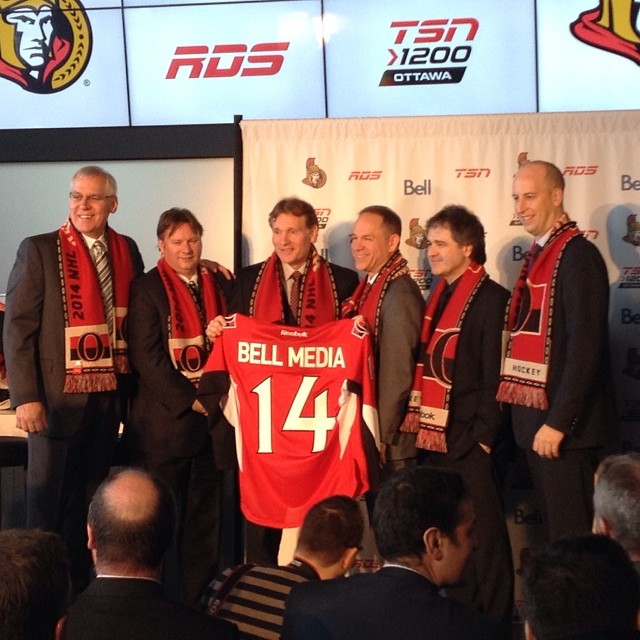Photo: via the Senators’ Instagram
Shortly before today’s press conference at noon, Bell Media released the details (well, most of them) surrounding their procurement of the Senators’ regional broadcast rights.
This 12-year agreement that will run through the 2025-26 NHL season not only encapsulates the broadcast rights, but telecommunications and retail sponsorship and activation rights opportunities.
Here are the basic tenets of the deal:
– English-language regional television broadcast rights for TSN – a minimum of 52 regular season and pre-season games
– French-language regional television broadcast rights for RDS – a minimum of 40 regular season and pre-season games
– English-language broadcast rights for TSN Radio 1200 – all games
– French-language radio broadcast rights – all game
Disappointingly, the financial terms of the deal were not disclosed, but according to the Ottawa Sun’s Bruce Garrioch, the Senators could gross up to $400-million as result of their new broadcast deal with Bell Media, the Ottawa Sun has learned.
Both sides have been mum on the specifics, but if those numbers are to be believed, it means that the Senators would average $33.3 million per season.
Earlier this week Garrioch indicated that the Senators only made about $7 million per season off their previous agreement, although there’s no clarification whether this was an all-inclusive total or just what the Senators grossed off of their deal with Sportsnet.
Whatever the case, it’s certainly a sizeable boost in revenue for the Senators.
The Senators were already due for an increased boost thanks to the NHL’s Canadian national broadcast agreement worth $5.2 billion.
At the time that this deal with Rogers was announced, Pierre Lebrun explained that the 12-year deal, announced Tuesday morning, is worth $436 million per year for the league and its 30 teams.
Divided by the 30 clubs, that’s an average of $175 million over 12 years per team ($14.5 million per year), although not every team will get the same share, a source said. The seven Canadian NHL teams will get a bigger share of the TV pie due to “invasion fees.”
Invasion fees are designed to compensate the Canadian teams for the local inventory lost to the national TV deals.
Bruce Garrioch came to the conclusion that the national rights on the new deal will pay teams in Canada an estimated $17-to-$20 million.
To put things in perspective, under the old television deal, Chris Botta indicated that the NHL received $190 million annually from the television networks – or about an average of $6.3 million per team. Taking that crude average and adding the $7 million that Ottawa earned from their regional rights, we’re potentially looking at a boost in annual revenue from $13.3 million to upwards of $50-53 million if the speculated figures being reported are true. To put this into context, in their 2013 valuations, Forbes pegged Ottawa's revenues at approximately $83 million.
Whatever the case, this is substantial jump in revenue without the team having sold a ticket or piece of merchandise.
There is no question that this improved revenue stream will create a proportionate response from the fans in their expectation(s) that this franchise will spend money to improve their on-ice competitiveness.
There has always been this consistent message that if there’s the right deal to be made, the Senators will be willing to take on salary to make this team better, but now that it’s assumed the Senators will have the financial wherewithal to make trades that aren’t dollar for dollar, the message from fans to make this team better using any means necessary is only going to get louder.
That’s not to say that the Senators have to whimsically spend in the free agent market or overlook the acquisition of bad contracts, I think most fans can appreciate an efficient and sound asset/cap management strategy. Moreover, the team does not necessarily have to spend all of this money by pouring it directly into on-ice player acquisitions.
Assistant GM Randy Lee was recently on TSN 1200 and mentioned that the Senators have one of the smallest hockey ops staffs in the league, so the Senators can divert some of these financial resources or revenues to prop up its player personnel and scouting infrastructures – which indirectly will hopefully create that steady streamline of internal talent so that the organization does not have to go out and spend externally to improve the team.
The Senators certainly don’t have to be a cap ceiling team to be competitive or have a chance to contend, but its fans have grown weary of the team’s crying poor routine or the strict limits of its self-imposed internal budget.
More than anything however, fans want to take pride in this organization from the players, to scouting staff, to the front office personnel and right through to ownership. Thanks to these television deals, the Senators have a chance to do that, but it’s up to them to follow through.
In case you were wondering how large Ottawa’s regional viewership, here’s a great tweet by Scott:
tweeted this out before, but here's average regional viewership for all teams last season (scale is thousands) pic.twitter.com/WXMlDSvfq1
— scott (@Wham_City) January 29, 2014
//platform.twitter.com/widgets.js
Add The Sports Daily to your Google News Feed!
